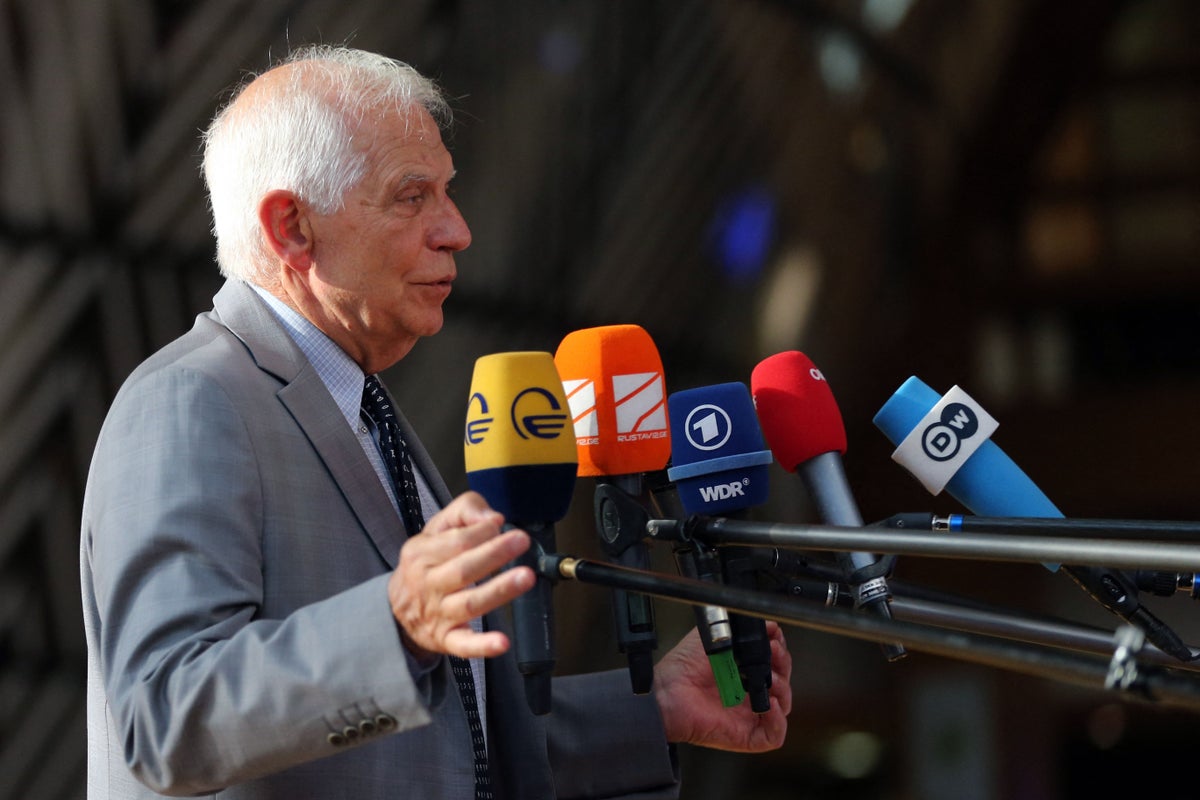
European Union foreign ministers have approved a £424m military aid package for Ukraine as they begin talks on banning Russia’s gold exports and adding more Kremlin-linked oligarchs to the sanctions list.
It comes amid concern that international financial penalties imposed after the Ukraine invasion have failed to prevent Vladimir Putin adding £82bn to his war chest in the first 100 days of the conflict.
The huge injection of money came from sales of energy products, with Moscow taking advantage of a spike in prices and selling heavily-discounted oil to major purchasers such as China and India.
Gold is Russia’s second-largest export after oil and gas and has been used by Moscow to back up its currency and circumvent sanctions already imposed by the West and a number of other states.
On restrictive measures, EU foreign affairs chief Josep Borrell said that “at the moment the most important thing is a ban on Russian gold”. He also spoke of the urgent need to secure the port city of Odesa to ensure that blocked grain shipments are freed, stressing: “It’s an issue of life and death for many human beings. And the question is that Russia has to de-block and allow Ukrainian grain to be exported.”
Ursula von der Leyen, the European Commission president, said Moscow “must continue to pay a high price for its aggression” and all further sanctions needed will be imposed.
The extra military aid raises the total pledged by the EU in defence equipment to £2.1bn. Lithuanian foreign minister Gabrielius Landsbergis said: “If anything needs to be continued, it is weapons deliveries. And if anybody can do that, it is the main industrial countries of the Western world. They have to step up with that.”
Dmytro Kuleba, the Ukrainian foreign minister, said his government was “grateful” for the new funds but urged the EU to continue military supplies to enable his country to defend itself.
As well as the EU pledges, further measures being considered by the US, Britain and its allies are a cap on Russian oil prices – a move they say will restrict revenue for the Kremlin while still permitting supplies to reach countries that have not imposed import bans, thus avoiding crippling energy shortages.
Insurance companies will have a major part to play in any capping process. It would be extremely difficult for markets to receive Russian oil by sea without this service, and insurers in London, the international centre for marine insurance, must cooperate if the policy is to succeed. The International Group of Protection & Indemnity Clubs in London covers around 95 per cent of the global oil shipping fleet.
Alexander Rodnyansky, a senior adviser to Ukrainian president Volodymyr Zelensky, maintained that secondary sanctions on countries helping Russia circumvent financial penalties may be the necessary way forward.
“Currently, firms in China or other parts of Asia don’t really have much of an incentive to try and stick to the sanctions regime because they don’t participate,” he told The Independent. “That’s why I’ve been asking for secondary sanctions: because the firms have a lot more to lose from potentially not trading with Europe and US with penalties imposed on them than they gain from trading with Russia; facing secondary sanctions will change their calculus.”
Mr Rodnyansky, an associate professor of economics at Cambridge University, said Ukraine was fully aware that Russia will seek to use the threat of rising energy prices in Europe, and the economic hardship it would bring, to try to pressurise Ukraine through the West.
“The Russians understand how the system works, how the democratic decision-making works in the West, and that’s what they’re trying to exploit. They want Ukraine to accept the status quo, the loss of territory, and strike some sort of deal.
“They will use the time of the ceasefire to regroup, rearm and then restart their war of aggression. So we know what kind of deal they want and, of course, we can’t accept it. “
“We know the Russians want to exploit anything they can in the situation in the West. But we are also very thankful that the support for Ukraine remains so overwhelming.”







